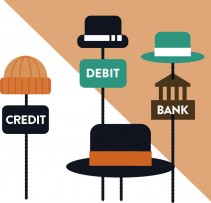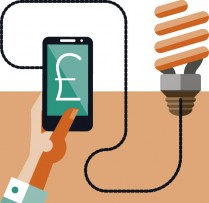1 Hang Fire Smokehouse
 To stop missing out on card-driven sales during busy periods, this Cardiff-based southern-style barbeque food enterprise worked with EE to introduce a mobile technology-focused solution. “Customers increasingly expect to pay by card,” says Shauna Guinn, Hang Fire Smokehouse’s co-owner. The business had previously had to turn down customers who don’t carry cash, but it now uses a 4G pop-up bundle, which includes an iZettle Pro contactless card reader. This has enabled the Smokehouse to process chip-and-PIN, contactless card and mobile payments over 4G. It’s resulted in an increase in impulse purchases. “Transactions are now also a lot quicker, increasing the amount of customers we are able to serve,” says Ms Guinn. “At Christmas 2015 we managed to serve hundreds more customers than the year before.”
To stop missing out on card-driven sales during busy periods, this Cardiff-based southern-style barbeque food enterprise worked with EE to introduce a mobile technology-focused solution. “Customers increasingly expect to pay by card,” says Shauna Guinn, Hang Fire Smokehouse’s co-owner. The business had previously had to turn down customers who don’t carry cash, but it now uses a 4G pop-up bundle, which includes an iZettle Pro contactless card reader. This has enabled the Smokehouse to process chip-and-PIN, contactless card and mobile payments over 4G. It’s resulted in an increase in impulse purchases. “Transactions are now also a lot quicker, increasing the amount of customers we are able to serve,” says Ms Guinn. “At Christmas 2015 we managed to serve hundreds more customers than the year before.”
2 Charlotte’s Group
Fast-growing British hospitality business Charlotte’s Group has been pioneering its first fully cashless operation, Charlotte’s W5, since January this year. The destination uses contactless payment methods – debit and credit cards, American Express and Apple Pay – but not cash. As it says on its website: “We’re so 2016.” Owner Alex Wrethman says: “It’s saving us a significant amount of time and money. We save around three hours a day of a manager’s time, lower insurance due to no cash handling on the premises, less room for human error in reconciliations, and a more seamless experience for both our staff and customers. The cost-savings also mean we are able to keep prices lower for our customers and add value in areas that are more important to them.” The company is expected to roll this no-cash model out to its other destinations.
3 Monsoon Accessorize
 Formerly known as e-receipts, Yocuda is changing the way high street stores can capture customer details and increase sales in the process. Retailers are able to get customer data at the checkout and send digital receipts as pdf attachments. The customer data can then be collected daily from the server. Monsoon Accessorize uses it to work with the shop’s existing point-of-sale infrastructure and online platform as well as integrating with its product recommendation engine RichRelevance. The store has also partnered with Worldpay to implement tablet devices for assisted selling in-store. This puts more of the salesforce back on the shop floor where they can deliver a more personalised, consultative shopping experience. Linking these devices to the internet also means staff now have access to the whole retail inventory.
Formerly known as e-receipts, Yocuda is changing the way high street stores can capture customer details and increase sales in the process. Retailers are able to get customer data at the checkout and send digital receipts as pdf attachments. The customer data can then be collected daily from the server. Monsoon Accessorize uses it to work with the shop’s existing point-of-sale infrastructure and online platform as well as integrating with its product recommendation engine RichRelevance. The store has also partnered with Worldpay to implement tablet devices for assisted selling in-store. This puts more of the salesforce back on the shop floor where they can deliver a more personalised, consultative shopping experience. Linking these devices to the internet also means staff now have access to the whole retail inventory.
4 SSP Hats
Skegness family business SSP Hats wanted to reach a wider customer base, but realised it needed to offer a larger variety of payment methods. The company now uses independent payment service provider Sage Pay, a partner of cross-border e-payment specialist PPRO Group. Using Sage Pay has allowed SSP Hats to serve its larger merchant clients who were looking to sell their goods online in the European market, where traditional UK payment methods are not always accepted. Sarah Fennell, SSP Hats’ finance manager, says: “Once we could provide customers with their preferred local payment options, we saw an increase in confidence in our service, which led to a boost in both customer and order numbers. For example, the order value has increased tenfold in Germany.” Systems such as Giropay enabled the company to offer a speedier service to overseas customers.
5 Robin Hood Energy
 RHE is the UK’s first local authority-owned energy supplier. Since launching in September 2014, the group has already attracted a significant number of clients from other suppliers, partly down to flexibility with payments. Contracts manager Rob Purdon says: “allpay provided the experience and expertise to manage our direct debit collections and, once in place, we added its extended range of payment channels giving payment flexibility to our customers. The majority of customers are paying by direct debit with the remaining credit customers paying upon receipt of a bill, which is where they have the option to pay online, through the automated phone or via the call centre.” Working with allpay allowed RHE to contract with a single company for a range of payment channels, meaning less worry about separate merchant accounts or regulatory compliance.
RHE is the UK’s first local authority-owned energy supplier. Since launching in September 2014, the group has already attracted a significant number of clients from other suppliers, partly down to flexibility with payments. Contracts manager Rob Purdon says: “allpay provided the experience and expertise to manage our direct debit collections and, once in place, we added its extended range of payment channels giving payment flexibility to our customers. The majority of customers are paying by direct debit with the remaining credit customers paying upon receipt of a bill, which is where they have the option to pay online, through the automated phone or via the call centre.” Working with allpay allowed RHE to contract with a single company for a range of payment channels, meaning less worry about separate merchant accounts or regulatory compliance.
6 TALKINGTECH
Payment technology provider TALKINGTECH works with some of the world’s largest utilities and communications organisations, making it easier for customers to pay bills promptly. Pay by SMS is a new payment channel available to 02 customers in arrears, allowing them to resolve outstanding balances with a simple reply to a text message. Customers with a registered card are sent an SMS, alerting them to their outstanding balance and requesting payment. The customer replies “yes” followed by the last four digits of their card. Customers without a registered card are sent a one-way SMS asking them to call the automated payment IVR (interactive voice response) to pay and register their card for the future. The company says this has helped to reduce the cost of collections by 7 per cent.
7 Joules
Tom Joule turned cottage industry country clothing brand Joules into an international fashion exporter using international payment innovations from Computop. The company has been able to expand into the United States and Germany offering locally preferred payment methods and reducing the risk of fraud by eliminating high-risk transactions. This suits German consumers who prefer to pay by direct debit or invoice than credit card. So for the German market, the company introduced local payment methods such as electronic direct debit, Open Invoice with BillPay, automated bank-to-bank transfer via giropay and PayPal. “Computop’s tokenisation functionality helps simplify the buying process for returning customers and we expect Computop’s fraud protection tools will dramatically reduce overseas fraud,” says director of e-commerce James Davey.
8 Number Six
Men’s high-end street fashion store in East London’s Brick Lane, Number Six uses Vend, a cloud-based point-of-sale software which provides smaller retailers with the kind of technology usually reserved for the giants. It has meant smaller businesses such as Number Six can have access to inventory management and customer data as well as the ability to integrate with other e-commerce sites. Owner Jake Hardy says: “There are a number of benefits of being in the cloud, including convenience and transparency. Data can be shared between apps and important business information is now available from anywhere. As it’s cloud-based and therefore accessible from wherever I am, I can quickly oversee what we have sold and what our margins are in real time. I can also quickly and efficiently restock products.”
1 Hang Fire Smokehouse


